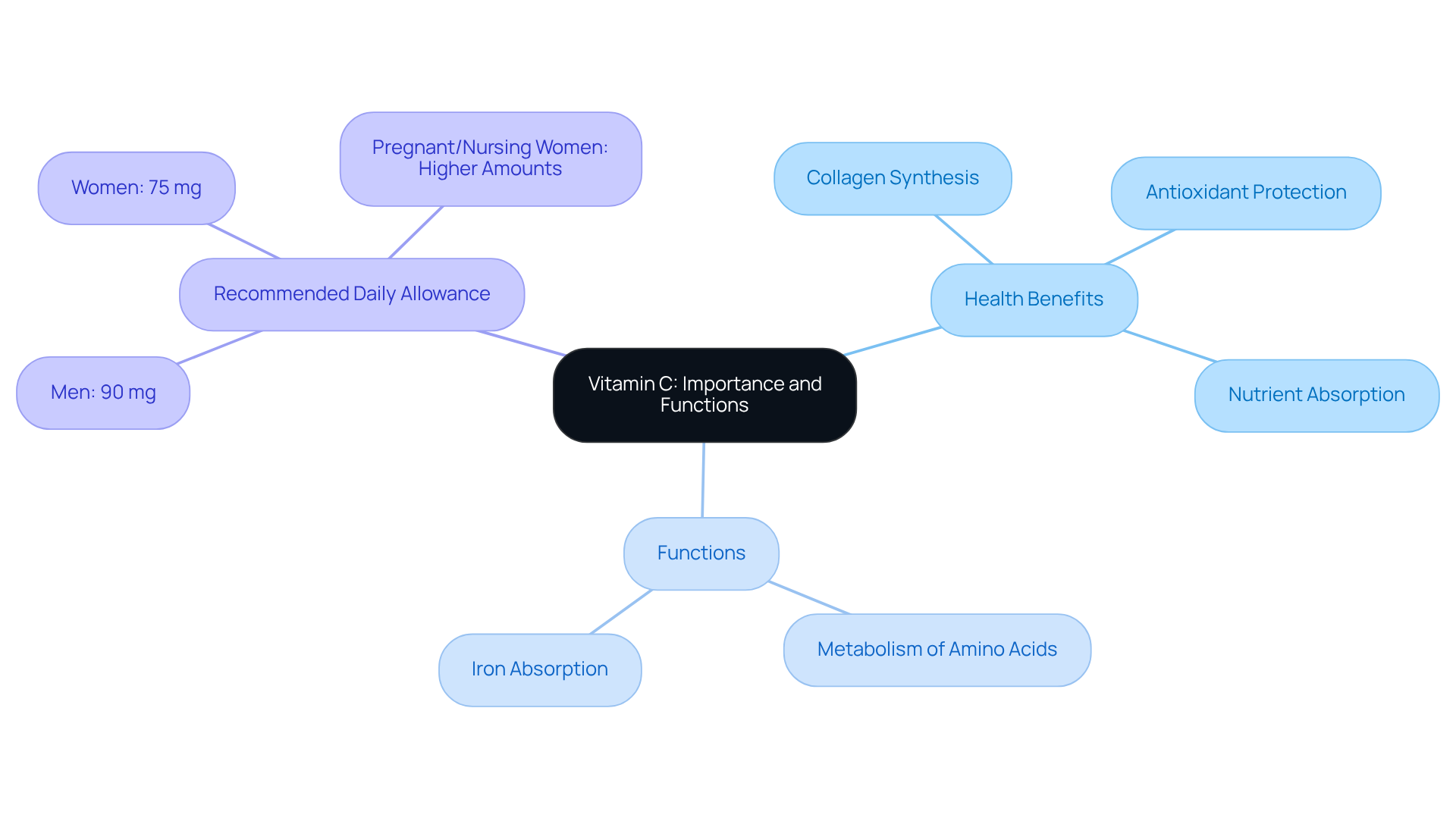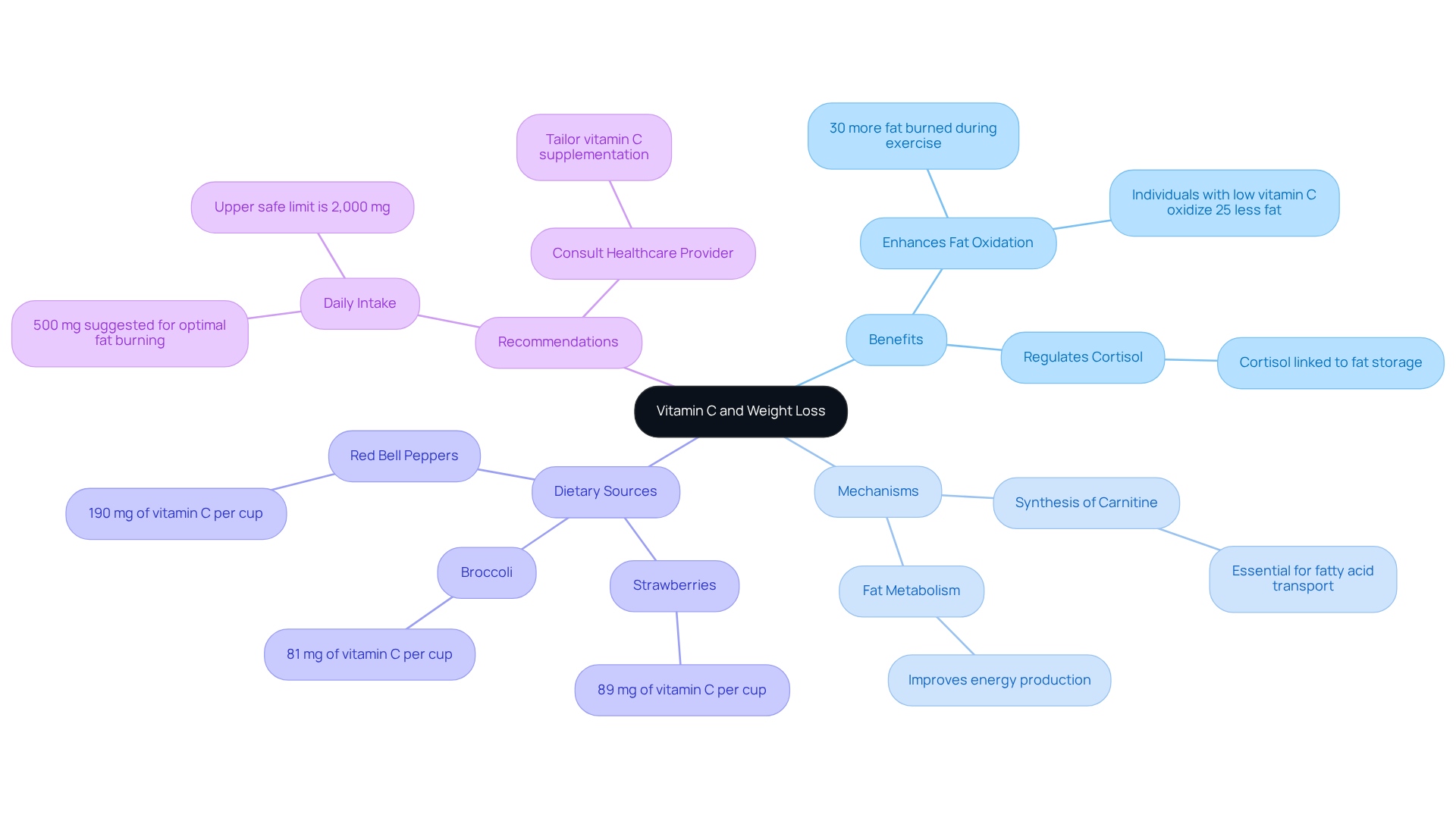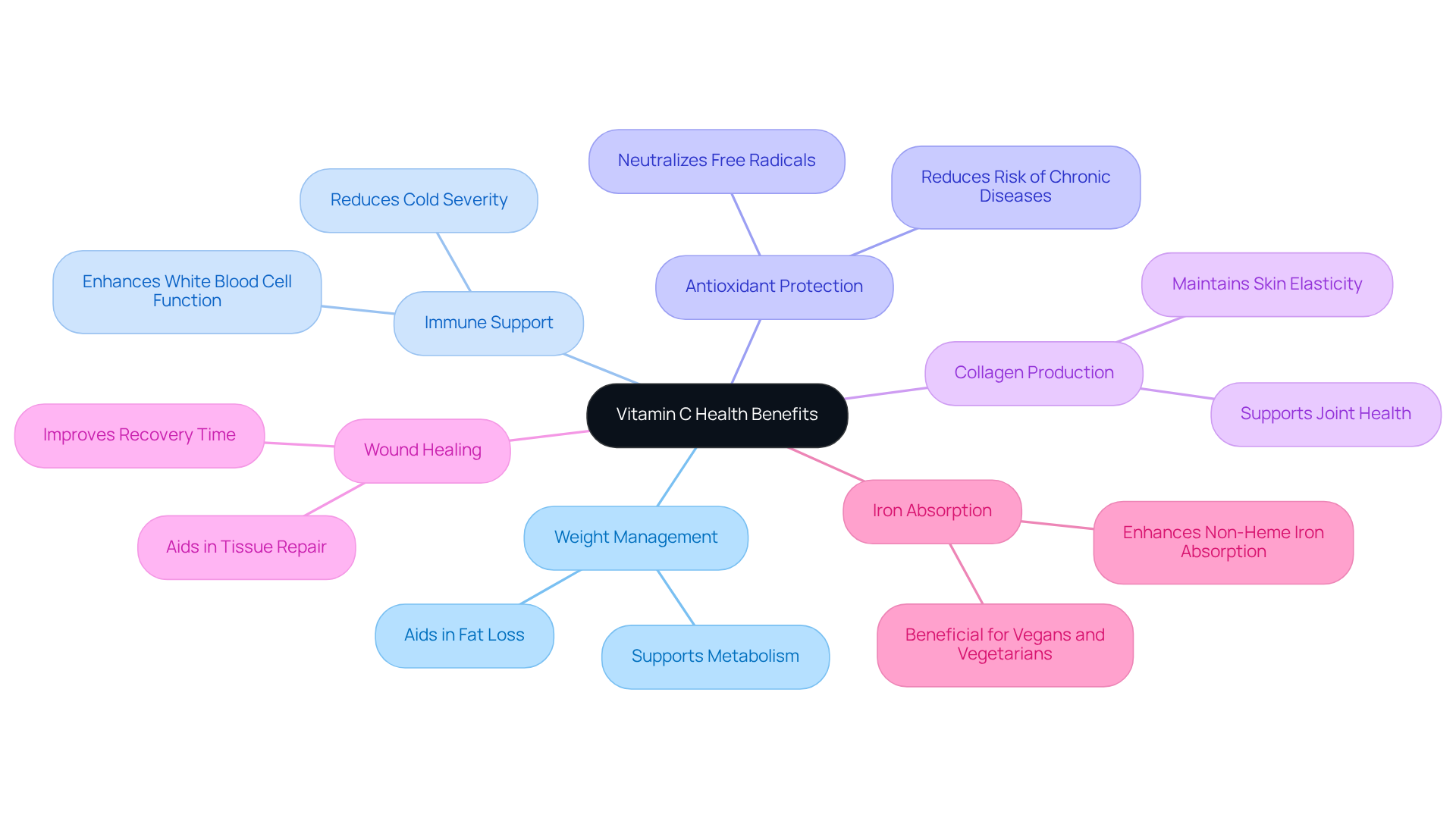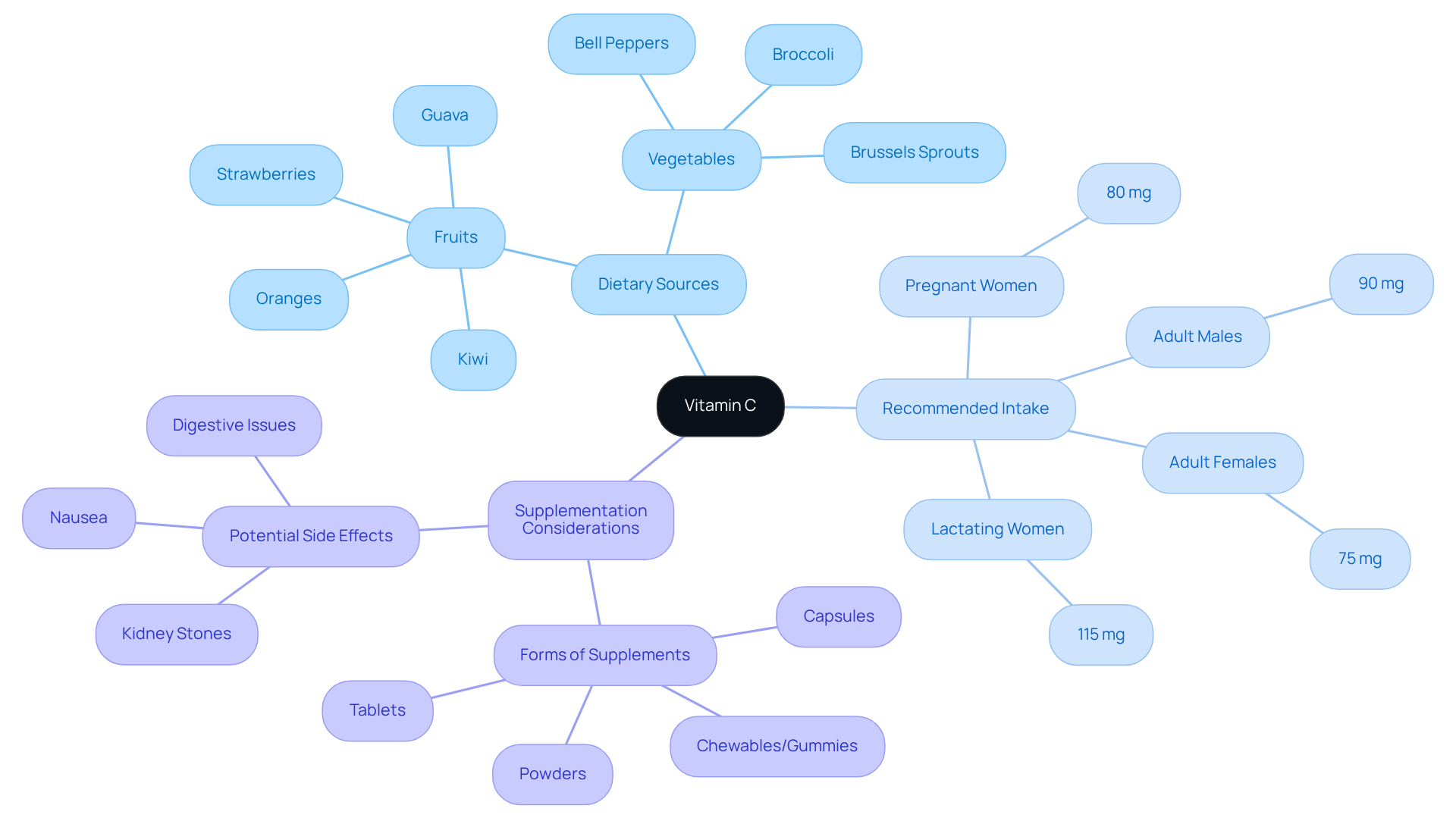Introduction
As you navigate the journey of effective weight management, you might be surprised to find a helpful ally in vitamin C. This essential nutrient is not just vital for your overall health; it also offers remarkable benefits for those aiming to shed a few pounds. Research shows that maintaining adequate vitamin C levels can significantly boost fat oxidation during exercise. So, how can adding this vitamin to your daily routine transform your weight loss efforts?
Let’s explore the multifaceted advantages of vitamin C together. We understand that weight management can be challenging, and incorporating this nutrient into your diet might just be the support you need. From its vital functions in the body to the dietary sources available, vitamin C can play a profound role in both your weight management journey and your overall wellness. You’re not alone in this journey, and with the right tools, you can achieve your goals.
Define Vitamin C: Importance and Functions
Ascorbic acid, often known as vitamin C, is a water-soluble nutrient that plays a vital role in our overall health. We understand that many of us may struggle to get enough of this essential vitamin, but knowing its benefits can inspire positive changes in our diets.
This powerful nutrient is crucial for the synthesis of collagen, a protein that keeps our skin, blood vessels, and connective tissues healthy. Imagine how much better you could feel with vibrant skin and strong connective tissues! Furthermore, ascorbic acid acts as a strong antioxidant, protecting our cells from oxidative stress and damage caused by free radicals. It’s like a shield for your body, helping you feel your best.
In addition to these roles, ascorbic acid is involved in the metabolism of amino acids and enhances the absorption of non-heme iron, which can improve your overall nutritional status. You’re not alone in this journey; many people overlook the importance of these nutrients in their daily lives.
The recommended daily allowance (RDA) for ascorbic acid is:
- 90 mg for men
- 75 mg for women
- Higher amounts suggested for pregnant and nursing women
By understanding these recommendations, you can take proactive steps toward better health. Remember, every small change counts, and we’re here to support you on this path to wellness.

Explore the Connection Between Vitamin C and Weight Loss
We understand that weight loss can be a challenging journey, and every bit of support matters. Research indicates that vitamin C and weight loss benefits are significant, as ascorbic acid supports weight loss by enhancing fat oxidation during exercise. In fact, individuals with elevated blood levels of vitamin C can burn up to 30% more fat during moderate physical activity compared to those with lower levels. This improved fat burning is partly due to the vitamin C and weight loss benefits derived from its role in synthesizing carnitine, a crucial molecule that helps transport fatty acids into the mitochondria for energy production.
Furthermore, maintaining sufficient levels of vitamin C can provide weight loss benefits by assisting in regulating cortisol, a hormone linked to fat storage, especially in the abdominal area. It’s important to note that around 15% of US adults are vitamin C deficient, highlighting the necessity of adequate intake. Foods rich in vitamin C, such as strawberries, broccoli, and red bell peppers, can help you meet your nutritional needs.
While ascorbic acid isn’t a standalone solution for weight loss, the vitamin C and weight loss benefits it offers can be advantageous when combined with a balanced diet and regular exercise. At CT Medical Weight Loss & Beyond, we offer a Custom Nutrition Program designed specifically around your body, goals, and lifestyle. This program ensures you receive personal support and expert advice from certified nutritionists, incorporating essential nutrients like vitamin C into your daily routine. We want you to feel motivated and supported from start to finish.
Moreover, studies show that people with low levels of vitamin C and weight loss benefits oxidize 25% less fat per kilogram of body weight during physical activity. This emphasizes the significance of adequate vitamin C consumption for achieving vitamin C and weight loss benefits in efficient fat metabolism. For optimal fat burning, a daily intake of 500 mg of ascorbic acid is suggested. Remember, you’re not alone in this journey, and we’re here to help you every step of the way.

Highlight Additional Health Benefits of Vitamin C
Vitamin C and weight loss benefits go beyond just being a tool for weight management; it is a vital ally in strengthening our immune system, helping our bodies effectively fight off infections and illnesses. As a powerful antioxidant, it protects our cells from damage caused by free radicals, which can lead to chronic diseases like heart disease and certain cancers.
Moreover, ascorbic acid is crucial for collagen production, a key protein that keeps our skin elastic and youthful, reducing those pesky signs of aging. This nutrient plays a significant role in wound healing, aiding in tissue repair and recovery, which is essential for our overall well-being.
In addition, ascorbic acid enhances the absorption of non-heme iron from plant-based foods, making it especially beneficial for those following vegetarian or vegan diets. Incorporating foods rich in Vitamin C can provide vitamin C and weight loss benefits while boosting our overall health and lowering the risk of chronic illnesses.
We understand that making dietary changes can be challenging, but remember, you’re not alone in this journey. Frequent intake of C-rich foods is a simple yet powerful step towards a healthier life, highlighting its importance as an essential nutrient in a balanced diet.

Identify Dietary Sources and Supplementation of Vitamin C
Ascorbic acid, or Vitamin C, is abundant in many fruits and vegetables, and we understand that getting enough of it can sometimes feel overwhelming. Citrus fruits like oranges, lemons, and grapefruits are well-known sources, but don’t forget about other delicious options like strawberries, kiwi, and guava. Even vegetables such as bell peppers, broccoli, and Brussels sprouts pack a substantial amount of this essential vitamin.
However, statistics reveal a concerning trend: the average intake of Vitamin C in the U.S. has dropped by 23% from 1999 to 2018. This decline raises questions about whether we’re meeting our daily needs. If you find it challenging to get enough Vitamin C through your diet alone, you’re not alone. Supplementation can be a helpful option. Vitamin C supplements come in various forms – tablets, capsules, powders, and even chewable or gummy options that many people love.
While supplements can be beneficial, it’s generally best to get your nutrients from whole foods whenever possible. Whole foods provide additional benefits, like fiber and other vital nutrients that supplements can’t match. Before starting any supplementation, it’s wise to discuss it with a healthcare professional to ensure it aligns with your personal wellness needs.
Current recommendations suggest a daily intake of:
- 75 mg for adult females
- 90 mg for adult males
- Higher needs for pregnant and lactating women
Case studies have shown that consistently consuming 100 to 200 mg of ascorbic acid can boost immune function and may even help ease cold symptoms. This highlights just how important Vitamin C is for our overall health and wellness.
Yet, it’s crucial to be aware of the potential side effects of excessive Vitamin C intake. Overdoing it – especially beyond 2,000 mg per day – can lead to digestive issues and kidney stones. So, let’s take care of ourselves and ensure we’re getting the right amount of this vital nutrient!

Conclusion
Vitamin C is more than just a nutrient; it’s a powerful ally in promoting overall health and aiding weight loss. We understand that navigating health choices can be overwhelming, but by recognizing the multifaceted benefits of vitamin C – from enhancing fat oxidation during exercise to bolstering the immune system – you can appreciate its vital role in your wellness journey. Adequate intake of vitamin C not only supports weight management but also contributes to skin health, tissue repair, and chronic disease prevention.
Let’s explore some key points together. Vitamin C:
- Enhances fat metabolism
- Regulates hormones associated with fat storage
- Improves nutrient absorption
With many people experiencing vitamin C deficiency, it’s crucial to incorporate vitamin C-rich foods like strawberries, broccoli, and citrus fruits into your daily diet. Furthermore, while supplementation can be beneficial, it’s important to approach it with caution, ensuring you meet your specific health needs without exceeding safe intake levels.
Ultimately, the importance of vitamin C extends far beyond weight loss. Embracing a diet rich in this vital nutrient can lead to improved overall health and vitality. As you strive for your health goals, prioritizing vitamin C is a simple yet effective step towards achieving lasting wellness. Remember, making conscious dietary choices and seeking professional guidance can empower you to harness the full benefits of vitamin C, paving the way for a healthier future. You’re not alone in this journey; together, we can take steps towards a brighter, healthier tomorrow.
Frequently Asked Questions
What is vitamin C and what is its other name?
Vitamin C, also known as ascorbic acid, is a water-soluble nutrient that is essential for overall health.
Why is vitamin C important for our bodies?
Vitamin C is crucial for the synthesis of collagen, a protein that maintains healthy skin, blood vessels, and connective tissues. It also acts as a strong antioxidant, protecting cells from oxidative stress and damage caused by free radicals.
How does vitamin C contribute to nutritional health?
Ascorbic acid is involved in the metabolism of amino acids and enhances the absorption of non-heme iron, which can improve overall nutritional status.
What is the recommended daily allowance (RDA) for vitamin C?
The RDA for vitamin C is 90 mg for men and 75 mg for women. Higher amounts are suggested for pregnant and nursing women.
How can understanding vitamin C recommendations help individuals?
By knowing the recommended amounts of vitamin C, individuals can take proactive steps toward better health and make positive changes in their diets.




